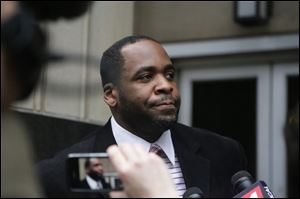
Farewell to an era
3/13/2013
Kilpatrick
Kwame Kilpatrick was found guilty this week of racketeering and extortion. The verdict capped a historic five-month public corruption trial that showed how the former Detroit mayor used his office to enrich himself and his friends, steering $84 million in work to a contractor who became his codefendant.
The Kilpatrick era, which distracted and divided Detroit and Michigan for a decade, is over, and the city must move forward. But healing won’t be easy.
Despite the media frenzy that followed the verdict, it was a sad day for Detroiters. Many of them defended their once-promising native son to the end. One juror, who twice had voted for Mr. Kilpatrick for mayor, spoke for many Detroiters when she said that what she learned over the past six months turned her stomach.
The rise and fall of Mr. Kilpatrick, now 42, represents an American tragedy of wasted potential. The son of former Congressman Carolyn Cheeks Kilpatrick, Mr. Kilpatrick became the city’s youngest mayor in 2001, rising to power on the fervent hopes of Detroiters, young and old.
He was smart, charismatic, and brash, wearing a winning smile, a broad-brimmed fedora, and a diamond stud. Beneath the flash were the extraordinary political skills that previously made him the first African-American House minority leader in the Michigan Legislature.
During the 2001 campaign, he seduced more than Detroit’s voters. He became the darling of the city’s media and of the region’s economic power brokers.
But Mr. Kilpatrick couldn’t handle his own power. The city he genuinely loved became a personal playground. His arrogance grew as reports of lavish spending, late-night parties, bribes, payoffs, and sexual liaisons piled up.
Despite the heat, Mr. Kilpatrick maintained his swagger and an almost eerie air of invincibility. As the verdict was read on Monday, Mr. Kilpatrick appeared stunned. To the end, he thought he was untouchable.
The federal jury found Mr. Kilpatrick guilty of 24 of the 30 charges against him. But he was not responsible for ruining Detroit, even though his scandal-plagued administration gave people in Michigan another misguided and self-defeating excuse to ignore the city’s plight. In truth, Mr. Kilpatrick’s administration made progress on transportation, public safety, and economic development.
The flight of people and capital that has turned large swaths of Detroit into a wasteland started 60 years ago, and continues today. The corruption and excesses that defined the Kilpatrick era have been a far easier story for media to tell than the complex economic and social issues that have vexed Detroit and every other urban area in America — including Toledo — for the past half century.
Even after he quit under pressure in 2008, Mr. Kilpatrick continued to divide the city and shape its media coverage and national image. Detroit’s current mayor, Dave Bing, complained in 2011 that controversy over Mr. Kilpatrick was overshadowing his administration’s progress.
Mr. Kilpatrick faces 20 years or more in prison. Federal prosecutors sent a message: Public corruption will not be tolerated, and public servants will be held accountable to the highest standards.
Meanwhile, Detroit still faces bankruptcy, the continued exodus of 15,000 residents a year, a failing public school system, and some of the nation’s highest poverty and crime rates. One third of the city’s land is empty.
As people in Detroit and Michigan turn their attention to resolving the city’s crushing problems, they cannot allow Mr. Kilpatrick to divide and distract them any longer. It’s time to say farewell to a troubled era.